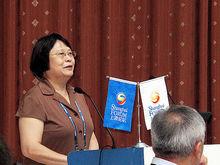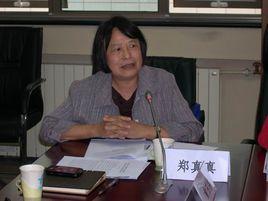人物經歷
女北京大學人口學博士(2000);本科畢業於中國科技大學電子學系(1977),曾留學美國並獲統計學(1990)和醫學信息學(1988)碩士學位;1992年留學回國後在北京大學人口研究所任教10年,現任中國社會科學院人口與勞動經濟研究所研究員,中國社會科學院研究生院教授、博士生導師。
主講課程
為研究生講授"社會科學研究方法"。
研究方向
統計學和人口分析技術的套用,婦女人口研究,生育健康的社會科學研究。
主要貢獻
研究課題
 鄭真真
鄭真真基於"五普"數據對中國人口受教育狀況的研究、出生性別比偏高的綜合對策研究、"青春健康項目"的評估研究、人口流動與健康問題研究、生育健康/計畫生育優質服務項目等。
研究成果
(中文)
《人口流動與農村婦女發展》鄭真真、解振明主編. 社會科學文獻出版社,2004;
《套用數理人口學》N. 凱菲茨著. 鄭真真、顧大男、任強譯.華夏出版社, 2000;
《1980年以來我國育齡婦女婚育時間初析》鄭真真、王志理2001年全國計畫生育/生殖健康調查論文集中國人口出版社, 2004年;
《 中國育齡婦女的生育意願研究》鄭真真中國人口科學, 2004(5):73-78;
《 中國人口受教育狀況的性別差異》鄭真真、連鵬靈婦女研究論叢, 2004(5):14-18;
《社會科學實證研究中的統計分析方法套用》鄭真真人口研究, 2002(5):22-24;
《外出經歷對農村婦女初婚年齡的影響》 鄭真真中國人口科學, 2002(2):61-65;
《中國10~18歲青少年就學的影響因素分析》鄭真真、牛瑞琴、邢立強人口與經濟, 2002(2): 28-37;
《中國高齡老人喪偶和再婚的性別分析》鄭真真人口研究, 2001(5):70-75;
《 城市外來未婚青年女工的性行為、避孕知識和實踐》鄭真真、周雲、鄭立新等.中國人口科學, 2001(2):67-72;
《對我國育齡婦女生育健康狀況的分析個體指標的套用實例》鄭真真人口研究, 2000(6):8-21;
《對80年代以來我國婦女初婚-初育間隔的分析》鄭真真人口與經濟,1999(2): 13-17;
《生育健康指標研究的回顧與展望》鄭真真人口研究,1999(1): 56-59。
研究成果
(英文)
Education Status of the Chinese Population: an Overview.Zheng Zhenzhen and Zhang Yan. China Population Today 2004(4-5).
Patterns of Temporary Labor Migration of Rural Women from Anhui and Sichuan. Kenneth Roberts, Rachel Connelly, Zhenming Xie, and Zhenzhen Zheng. The China Journal, 2004 July(52): 49-70.
Toward a client-centered performance assessment: ten years of evolution. Zheng Z, Xie Z, Zhang E. In: ICPD+10 in China. 2004.
Migration experience and women's empowerment in China. Zheng Z. and Gu B. In: ICPD+10 in China. 2004.
The role of civil society in the reproductive health program in China. Zheng Z., Liu H., Liu S., Gu B. In: ICPD+10 in China. 2004.
Determinants of School Enrollment and Completion of 10 to 18 Year Olds in China. Connelly, Rachel and Zheng, Zhenzhen. Economics of Education Review, 22 (2003), pp.379-388.
Sexual behavior and contraception use among unmarried young female migratory workers in 5 cities of China. R Zheng Zhenzhen, Zhou Yun, et al. eproductive Health Matters, 2001(17-May):118-127.
Social-Demographic Influence on First Birth Interval in China, 1980-1992. Zheng Zhenzhen. Journal of Biosocial Science, 2000 (32): 315-327.


